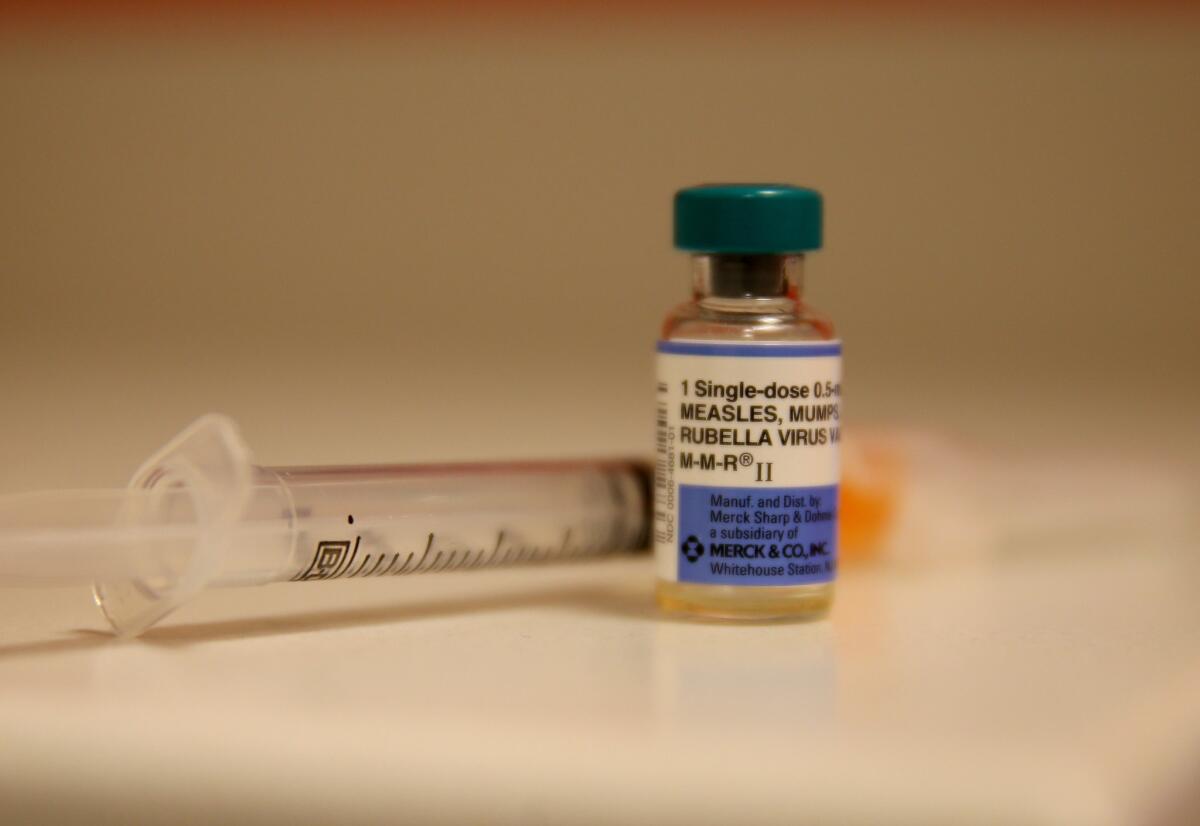The Disneyland measles crisis: how to make negligent parents pay

- Share via
The continuing and spreading outbreak of measles traced originally to visitors to Disneyland and Disney’s California Adventure park revives the questions of who should be held responsible, and how they should be made to pay for the injury and illness they’ve caused.
Here’s one suggestion, offered Thursday by science writer Alex Berezow in a USA Today op-ed: “Parents who do not vaccinate their children should go to jail.” That may be an extreme remedy, but Berezow’s notion that non-vaccinating parents should shoulder the responsibility for their actions is widely shared among legal experts and bioethicists.
As the Los Angeles Times has documented, California has experienced an alarming increase in “personal belief” exemptions allowing unvaccinated children to attend public and private schools, and a parallel decrease in immunization rates among kindergartners in many communities.
Most alarmingly, the trends often are associated not with low-income neighborhoods, where the cost of a vaccine might be an issue (though less so since the Affordable Care Act mandated that preventive treatments such as vaccines be provided without cost-sharing), but in affluent communities, among ostensibly well-educated parents.
The community cost of infectious disease outbreaks can run into the millions; the cost to a family with a member who has suffered permanent debilitation can be incalculable. Measles has been dismissed erroneously by anti-vaccine activists as an innocuous disease. It’s not: It can lead to complications ranging from pneumonia (1 in 20 infected children), which can be lethal for an infant or young child, to encephalitis, which the CDC advises “can lead to convulsions and can leave the child deaf or mentally retarded.” One or two children per 1,000 infected will die, and pregnant women can give birth to impaired babies.
The current outbreak appears destined to get worse before it ebbs. Measles is contagious for days even before the telltale red spots appear. Scarcely a day passes without a new report of an infected person unwittingly exposing others to the disease by the scores or hundreds by visiting a hospital, going to class or dining out.
There are few scientific, legal or ethical obstacles to holding non-vaccinating parents responsible to outbreaks caused by exposure to their infected family members. Medical and epidemiological science is sufficiently advanced to identify the source of transmission from one infected individual to another in many cases and establish a causal link sufficient to stand up in court.
“Liability could certainly exist if a parent simply chose not to vaccinate his child and a death results,” bioethicist Arthur L. Caplan and several colleagues argued in a 2012 paper. Even if state law permits the exemption, that may not protect the parent from liability, they said.
Parents who choose not to vaccinate their children are almost always negligent under the law, says Dorit Rubinstein Reiss of UC’s Hastings law school in a 2014 paper. One doesn’t have to know that one’s choice is wrong or risky to be negligent, she and her co-authors observe. In non-vaccination cases, the parents plainly should know they’re making an unreasonable or reckless choice with consequences for people in the community, considering “the abundant information from reputable sources supporting immunization, and the problematic sources relied upon by those who choose not to vaccinate.”
“Sincere belief that your choice is the correct one doesn’t make it any less negligent when it imposes risks on others,” they write.
How to make the negligent pay? Lawsuits from injured families or public health authorities for compensation is one way. Reiss and her co-authors propose levying a “no-fault” tax or fee as the price of an exemption, except for a medical exemption, and basing it on the actuarial cost of skipping immunization.
The problem there is that a tax sets a price on non-immunization that many families may be willing to pay. It even amounts to an implicit endorsement of the anti-vaccination movement, which works against society’s interest in having everyone vaccinated, with very rare exceptions.
Accepting the negligence of the non-vaccination decision, however, does allow society to forbid people to make that choice. As we reported earlier, California has become inexcusably lax in granting “personal belief” exemptions from child vaccinations.
Effective last year, all that was required was an affidavit from the parent stating that their personal beliefs militated against vaccination, and a form signed by a doctor, osteopath, nurse practitioner, physician’s assistant or “naturopathic” doctor stating that the parent, guardian, or student had received information about the benefits and risks of immunization and the danger to the community of going without.
Of course, that’s a joke. California bristles with offbeat pediatricians and other professionals happy to sign this meaningless form. It’s incumbent on the Legislature to shut this loophole, stat, and start compelling compliance with the law. Vaccines should be restored to their status as mandatory; the law should bar exemptions except for medical complications and genuine religious credos. It should be made clear that schools have the legal right to refuse enrollment to children left unvaccinated by parental choice. The Medical Board of California should advise its licensees, now, that purveying unorthodox immunization advice could be judged to be a departure from the standard of care, and place their license in jeopardy.
The scale of the unfolding outbreak makes California seem not a beacon of modern science but a repository of medieval ignorance. It’s entirely rational to require those whose actions have contributed to this outbreak to pay the cost; but it’s even more important to make them get the shots.
Keep up to date with the Economy Hub. Follow @hiltzikm on Twitter, see our Facebook page, or email mhiltzik@latimes.com.







